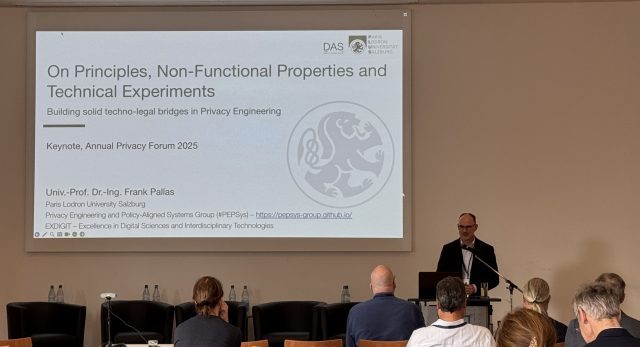Our Exdigit team
Our Researcher – The bright and beautiful minds behind our knowledge.
Mahdi Akil, PhD
Mahdi Akil is an EXDIGIT Research Associate (PostDoc) in the Privacy Engineering and Policy-Aligned Systems (PEPSys) group. His research focuses on privacy-preserving authentication in smart environments, leveraging technologies such as zero-knowledge proofs and attribute-based credentials. He designs short-lived credential systems for privacy and accountability, develops adaptive security policies to enhance trust in distributed infrastructures, and creates cryptographic protocols for edge and IoT environments. His work under EXDIGIT bridges applied cryptography, zero-trust models, and distributed system performance with privacy engineering and policy.
Univ.-Prof. Dr. Arne Bathke
Scientific Co-Manager of EXDIGIT,
Head of Division Data Science, Statistics, Stochastics (DSSS), Deputy Lead of the Artificial Intelligence and Human Interfaces Department
Professor of Statistics
Univ.-Prof. Mag. DI Dr. Christine Bauer
Christine Bauer is a Professor of Interactive Intelligent Systems at the Paris Lodron University Salzburg (PLUS) and a Co-Lead of the focus area “InterMediation. Music—Effect—Analysis” at the inter-university institution Wissenschaft & Kunst. Her research intersects human-centered computing, data science, and artificial intelligence. She focuses on recommender systems in general, with a specific emphasis on the music and media domains. Core research interests are fairness in algorithmic decision-making and multi-method evaluation. She holds a Doctoral degree in Social and Economic Sciences (Business Informatics), a Diploma degree in International Business Administration, and a Master’s degree in Business Informatics. Additionally, she studied Jazz Saxophone. She is on the Editorial Boards of TORS, TOIS, and JITT.
Dr. Eleonora Carrozzo
Dr. Anna Eleonora Carrozzo is a post-doc researcher. Her main research interest lies in nonparametric statistics, multivariate statistics, resampling techniques, and statistical applications in Life Science. She is involved in methodological research investigating alternative statistical approaches to the analysis of data in the context of digital health and personalized medicine.
Dr. Zahra Dabiri
Zahra Dabiri is a post-doctoral researcher at Paris Lodron University of Salzburg. Her primary research focus is on developing methodologies for studying spatio-temporal change analysis, primarily using synthetic aperture radar (SAR) data and techniques such as Interferometry SAR (InSAR) and polarimetry. Additionally, she employs various methods in her research, including digital image processing, geospatial data analysis, data mining, machine learning, deep learning, and time series EO data analysis. She is involved in several national and international EU projects, funded by organizations such as the Austrian Science Fund (FWF) and the Austrian Research Promotion Agency (FFG).
Cansu Demir, MSc
Cansu Demir is a doctoral researcher specializing in human-vehicle interaction at the Department of Artificial Intelligence and Human Interfaces at Paris-Lodron University Salzburg, Austria. With a background in computer science and human-computer interaction, her research focuses on the development of intelligent cyber-physical systems for autonomous vehicles and enhancing their interaction with drivers and passengers. She is dedicated to advancing human-centered AI and future mobility solutions that prioritize the needs of both individuals and society. Cansu Demir is also a passionate STEM ambassador, committed to inspiring the next generation of young people, especially women, to explore careers in technology and science.
Yu Dong, MSc.
Yu Dong is a PhD researcher in Geoinformatics. Her primary focus lies in remote sensing technologies and their role in environmental policy compliance. Her research investigates the use of satellite-based data for monitoring and enforcing protocols like the EU Deforestation Regulation (EUDR). She is also interested in machine learning algorithms and AI techniques for the advanced processing and analysis of satellite imagery, with an emphasis on global datasets that support environmental sustainability.
Dr. Jonas Faria Costa
Jonas Faria Costa researches the concepts of agency, society, and place. He explores how the concept of place is fundamental in understanding human agency and sociality at large, but also vice-versa.
Within philosophy, his main areas of interest are social ontology, phenomenology, philosophy of action, and philosophy of mind. Beyond this, he engages with further areas that deal with agency, society, and place, such as geography, environmental psychology, and architecture. Besides his passion about the concepts of place, he has a strong interest in decolonial philosophy, philosophy of games, and Ancient Greek philosophy.
Jonas Faria Costa did his undergraduate degree in philosophy in Belo Horizonte, Brazil, and his MA and PhD, also in philosophy, in Manchester, England.
Dr. Florian Graf
Florian Graf is a postdoctoral researcher working at the intersection of machine learning, geometry, and topology. His research interests include the generalization capabilities of neural networks, the accuracy of dimensionality estimators, and time series modeling.
Dipl.-Ing. Mara Grilnberger, BSc.
Mara Grilnberger is a PhD student in computer science. She is interested in the theoretical and mathematical backgrounds of algorithms, specifically the design and analysis of efficient dynamic algorithms, where the input changes over time, allowing for fast updates to the existing solution. Her focus lies mainly on algorithms for graphs, which provide a versatile way to model different types of networks and associated techniques.
Dr. Glenda Hannibal
Glenda Hannibal is a theory-driven researcher who strives to bring together scientific and technological advancements in Computer Science with insights from Philosophy. She explores ways to fine-tune or modify various theories and methods used to evaluate AI and robotic systems that are currently influencing the everyday life of people. As part of the EXDIGIT, Glenda Hannibal is focusing on the intricate relation between trust and knowledge by working in the intersections of explainable AI, HCI, and recommender systems. She obtained a BA and MA in Philosophy from Aarhus University and a Doctorate in Computer Science from TU Wien (2022).
Daniel Katzlberger, MSc.
Daniel Katzlberger proceeding his PhD in computer science. He is interested in genomic research, where Daniel specialize on statistical and machine learning methods to analyze and interpret biological big data. He has a strong focus on the generalizability of relationships extracted by these methods across divers human ancestries.
Jaeah Lee, MA
Jaeah Lees research interest focuses on the sociocultural, temporal-spatial, and emotional aspects of diasporic communities. She explores how concepts of home, identity, and political gestures are constructed at an epistemological level, practiced by diasporic communities, and portrayed in films and moving images.
She holds a BA in International Relations and Media and Communications, as well as an MA in Visual Culture, with a focus on cultural studies, film studies, and contemporary French philosophy, both from Korea University in South Korea.
At EXDIGIT, she strives to maximize her interdisciplinary background by conducting projects that deepen both theoretical understanding and empirical case studies.
Nicola Leschke, MSc.
Nicola Leschke is a researcher and passionate privacy engineer. Inspired by legal regulations, like the GDPR, she designs, implements, and evaluates technologies with particular legal meaning. Her main research interest concerns the rights of personal data access and data portability. To mitigate challenges that are currently hindering data subjects from effectively using their rights, she employs means of web automation and data management.
Dipl.-Ing. Michael Linortner, MSc.
Michael Linortner is a Ph.D. student in the Department of Artificial Intelligence and Human Interfaces at the University of Salzburg.
His research interests include automated signal and image processing. His previous work focused primarily on biometrics, particularly hand and finger vein recognition. He found participating in an interdisciplinary project called “Interdisciplinary Research into Cultural Innovations with Digital Humanity Methods and Artificial Intelligence (KIKI): How Material Came into the Picture” to be an engaging experience. For his Ph.D. studies, he is investigating another area of image processing: the security of digital satellite images. The increasing public availability of satellite images requires security and forensic methods to ensure the integrity of this data. In the context of current global conflicts, it should be possible to identify false information ostensibly based on satellite images. Developing new intelligent algorithms to secure or watermark satellite images and detect attempts at tampering are key aspects of Michael’s work.
Therefore, interdisciplinary collaboration is necessary between informatics, image processing, artificial intelligence, and geo-informatics, where satellite-based imaging and data are processed.
Lea Maislinger, MSc.
Lea Maislinger MSc completed her Bachelor’s and Master’s degree in mathematics at PLUS with a focus on statistics and data science. As part of her doctorate, she is researching in the field of dependence modelling/detection and pattern recognition. Besides research, she has been engaged in several interdisciplinary projects within the IDA Lab Salzburg.
Dr. Narges Mehran
Narges Mehran is a post-doc researcher contributing to Salzburg’s EXDIGIT project. Her research interests include real-world distributed technologies, energy efficiency, and grid greening. This mainly comprises 1) anomaly detection in distributed computing by applying the ML models and 2) novel technical concepts, mechanisms, and components fostering electricity consumption enhancement and beyond.
Univ.-Prof. Dipl-Math. Dr. Franz-Benjamin Mocnik
Franz-Benjamin Mocnik is Professor of Space and Place in the Information Sciences. Previously, he was Assistant Professor of Cartography at the University of Twente, the Netherlands; a postdoctoral fellow in Geography at Heidelberg University, Germany; a visiting postdoctoral fellow in Spatial Cognition at the University of Bremen, Germany; and a twin fellow of the Hanse-Wissenschaftskolleg, Institute for Advanced Study, Germany. He received his doctoral degree from the Vienna University of Technology, Austria, and was awarded the Waldo-Tobler Young Researcher Award for his work on spatial data quality.
Univ.-Prof. Dr.-Ing. Frank Pallas
A computer scientist and engineer from the heart with long-standing experience in techno-legal research, Frank heads and coordinates the PEPSys group. His research interests comprise all sub-fields of privacy engineering and policy-aligned systems – from core technical concepts like anonymity guarantees and performance experiments to technically well-founded legal examinations.
Mag. Dr. Thomas Prinz
Mag. Dr. Thomas Prinz is Managing Director of the research company iSPACE plus GmbH (owned entirely by the University of Salzburg) and a Post-Doc at the University of Salzburg. As a geographer and geoinformatics researcher at the University of Salzburg, his expertise lies in the application of spatial data and geographic analysis methods.
He is particularly motivated by creating planning and societal value through interdisciplinary, data-driven research in areas such as sustainable mobility, spatial energy planning, spatial development, and alpine construction.
In recent years, he has gained extensive experience and expertise in developing methods, tools, and spatial indicators in the field of applied geoinformatics (Smart Settlement Systems), which he has applied in numerous national and international projects and initiatives.
Univ.-Prof. Dr. Manfred Tscheligi
Scientific Manager of EXDIGIT,
Head of Department Artifcial Intelligence and Human Interfaces,
Professor of Human-Computer Interaction
Dr. Eugen Unterberger
Eugen Unterberger is a postdoctoral researcher who conducts research in the field of cultural mediation using digital methods. He is interested in questions of how historical information can be prepared to generate long-lasting interest among different target groups from the lay sector through storytelling; how cultural information can be linked to become intuitively searchable through knowledge management systems; and what role places play in this context.
Valdy Wiratama, MA
Valdy Wiratama is a Doctoral Researcher at the University of Salzburg. His research focuses on the intersection of algorithmic governance, fairness, and socio-technical configurations within media platforms. To advance this focus, his current work explores the potential and implications of algorithmic auditing for fairness, particularly in relation to music recommender systems.
Additionally, prior to his current work, he contributed to interdisciplinary European projects that addressed transparency, discoverability, and sustainability across various media sectors. He drew upon the analytical foundation that was established through his bachelor’s degree in Economics, as well as his master’s degree in Arts and Culture Studies, in order to address these topics.
Dr. rer. nat. Georg Zimmermann
Dr. Georg Zimmermann has a solid background in Mathematics and Statistics (in particular statistical methods for small samples and rare diseases), complemented by considerable experience in interdisciplinary projects with the Life Sciences. Within EXDIGIT, he builds bridges between data science methodology and Bioinformatics (PLUS / PMU), clinical routine data (SALK), digital health (PLUS / SALK / Salzburg Research), and various (inter-)national cooperation partners.
The Projectmanagement Team
Katharina Schenk, BA
Ing. Andreas Stainer-Hochgatterer
Dr. Julia Walleczek-Fritz
Mag.(FH) Melanie Zemasch

